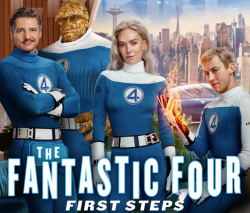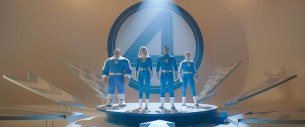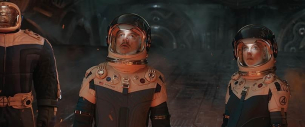As the MCU launches into Phase Six, “The Fantastic Four: First Steps” arrives with more than the typical cloak of anticipation—it lands with the weight of history. This is no mere reboot; it’s a reclamation, tasked not only with introducing new faces but with washing away the memory of failed prior film attempts. What emerges under Matt Shakman’s directorial eye is a reinvention rooted in both nostalgia and aspirational futurism—Marvel’s First Family, at last, on the edge of where superhero storytelling can go.
Re-Centering the Fantastic
Marvel wisely sidesteps the umpteenth origin story with “First Steps.” Instead of tedious flashbacks or rehashed cosmic accident lore, we meet Reed Richards, Sue Storm, Johnny Storm, and Ben Grimm as experienced, even idolized, adventurers. Their retro-futuristic Earth, an alternate 1960s paradise of progress, is as much a character as the ensemble itself. In this world, Cold War anxieties have faded—replaced by collective faith in the Future Foundation, a philanthropic juggernaut led by an expectant Sue Storm. The stark, hopeful aesthetic evokes both early Marvel comics and the Apollo era’s infatuation with what tomorrow could hold.
Matt Shakman’s film leans into the uncanny blend of nostalgia and modernization. Set design and costumes imagine a world where technological optimism and stylized modernism never went out of style: think mid-century glass towers, dashboards bristling with analog dials, bright pastel uniforms, and a Baxter Building equal parts laboratory, penthouse, and headquarters of planetary import.
Character-Driven Wonder
It’s the team itself that really sells the premise. Pedro Pascal’s take on Reed Richards avoids the usual academic aloofness: Reed is sharp, yes, but also painfully aware of the emotional currents in his team. His unspoken anxieties around fatherhood bleed into questions about consequence and scientific responsibility—how much discovery is too much?
Vanessa Kirby’s Sue Storm is the film’s anchor, balancing global diplomacy, personal vulnerability, and the subtle edge of a woman unwilling to be categorized. Kirby avoids “perfect” mum clichés, instead offering a Sue who is both visionary and fallible—a leader wrestling with the pressures of expectation, her own identity, and a world that expects her to balance both effortlessly.
Joseph Quinn’s Johnny Storm comes across as the most modernized of the bunch. Gone is the caricatured womanizer; here, Johnny is impulsive, funny, but self-aware and striving for depth. Quinn plays him as a lovable hothead—a show-off who wants to matter, not just be seen. His sibling bond with Kirby’s Sue (with jabs and genuine affection) grounds the film in family dynamics that feel real.
Ebon Moss-Bachrach’s Ben Grimm is, in many ways, this version’s secret weapon. The Thing’s visage is realized with peerless digital effects, but it’s Moss-Bachrach’s performance—humorously gruff but deeply wounded—that breathes life into Marvel’s most tragic hero. Ben’s longing for normalcy, filtered through loyalty to Reed and the Storms, lands as both raw and relatable.
Cosmic Scale Meets Human Stakes
Rather than narrowing focus to street-level antics or a lone supervillain, “First Steps” scales up with Ralph Ineson’s Galactus—a living cosmic hunger wrapped in noble purple and blue, at once mythic and menacing. His presence radiates inevitability, giving the threat a gravitas missing in other comic book villains. Julia Garner’s Shalla-Bal, as the Silver Surfer, never devolves into monotone servitude. Instead, her elegant, melancholy performance underscores the themes of sacrifice and cosmic debt, her movement across space both poetic and chilling.
The creative decision to open with a world already transformed by the Fantastic Four pushes the story into existential territory. The fate of their society—now beautifully peaceful, innovatively advanced—rests on questions of legacy, not just survival. Reed and Sue’s impending child (the subtle but ever-meaningful “first steps” of the title) becomes the emotional lodestone for the movie’s grand stakes: will tomorrow’s world still offer hope, or only loss?
Spectacle with Substance
Visually, Shakman’s vision is a controlled marvel of practical craft and digital wizardry. The movie’s look—a blend of Kubrickian symmetry and Silver Age flair—sets it apart from MCU sameness. The team’s craft, the Excelsior, feels expressly 1965 but with an edge of near-future believability. The Fantasticar, all curves and turbine engines, is its own call to childhood adventure. H.E.R.B.I.E., realized with animatronics and dry wit, is a crowd-pleaser with lines worthy of any Pixar favorite.
Michael Giacchino’s musical score synchs beautifully with the film’s themes. Swelling orchestral tracks echo the thrill of a Saturn V ignition, while subtle, whimsical tones humanize moments of family and doubt. Even the sound design—every force field ripple and Silver Surfer glide—adds to a lived-in, immersive world.
Script and Dialogue: New Rhythms, Deeper Questions
The writing—shaped by Josh Friedman, Eric Pearson, Jeff Kaplan, and Ian Springer—refuses to let the plot drown in cosmic bombast. Instead, the film finds genius in procedural debates, heart-to-hearts about fate and fear, and genuine laughter that arises from character rather than quippy formula. There are clever nods to both 1960s Marvel comics and modern anxieties: Dr. Doom (teased for the future) is nowhere to be found, making Galactus the true existential threat.
Pros
- Exceptional casting breathes humanity and originality into all lead roles
- Inventive visual style—retro yet futuristic, beautiful and memorable
- Eschews formulaic origin/MCU tropes in favor of established, confident heroes
- Galactus, as the antagonist, is drawn faithfully and with gravitas
- Supporting cast (Garner, Ineson) are given standout moments to impress
- Music score that stirs wonder, adventure, and pathos
- Succeeds in balancing spectacle with a deep, personal family narrative;H.E.R.B.I.E. provides welcome comic relief without feeling forced or childish
- Social and philosophical questions engage audiences beyond surface-level stakes
Cons
- Some fans may miss Doctor Doom’s immediate presence
- Pacing dips briefly for heavier reflection near the film’s midpoint
- Secondary villains and future MCU tie-ins receive minimal attention, sometimes feeling perfunctory
- Those hoping for a more contemporary, post-2010s tone may find the retro flavor distancing
- The already-superheroic team leaves newcomers with fewer “learning the ropes” moments
Conclusion
With “The Fantastic Four: First Steps,” Marvel Studios at last delivers an entry worthy of the team's moniker—a film bursting with invention, soul, and brazen optimism, but one that never sacrifices character for fireworks. Shakman and his cast craft a cinematic space where family, discovery, and peril are not mutually exclusive, but beautifully entwined. Whether you watch, stream, or download it online when it launches, this is more than just a new chapter; it’s the MCU recalibrating itself for a future where science and hope are as exciting as action and spectacle. If this is just the first step, the journey ahead promises greatness.
How to watch The Fantastic Four: First Steps online
After releasing in theaters on July 25, 2025, The Fantastic Four: First Steps will roll out online across major platforms. You’ll be able to watch the film by streaming it on Disney+ with a subscription (and download for offline viewing via the app), typically arriving 45–90 days post-cinema run. Amazon Prime Video and Apple TV will host digital purchase and rental options, supporting streaming and device downloads. Netflix and Hulu are not expected to feature the title at launch, while paid platforms like Peacock may add it at a later date. For free viewing or unblocked experiences, monitor ad-supported releases in the months following home debut, but initial digital access will require payment or subscription. The movie carries a PG-13 age rating in the US, for sequences of sci-fi action and thematic material.









